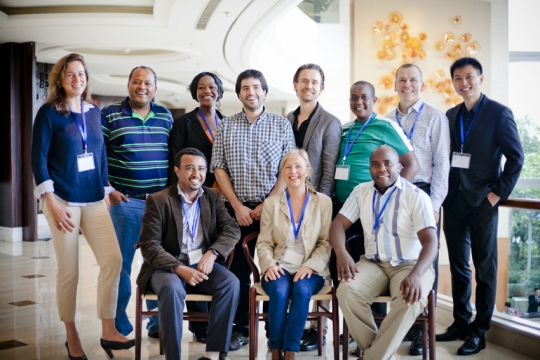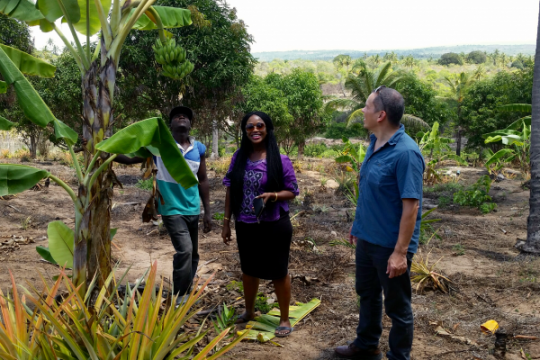Produce from small-scale farms is a mainstay for most Tanzanian households, and the ecosystem services provided by wild pollinators play a central role in their productivity. There is a fear that globally, animal pollinators are decreasing resulting in lower crop yields, which is why pollination is one of three ecosystem services chosen as a focus for the four-year Ecosystem Service Accounting for Development (ESAforD) project. One year into the launch of the program the researchers are starting to see preliminary results.
“We established there is a strong, positive and significant relationship between pollinators’ natural habitat and agricultural production,” said Byela Tibesigwa, a senior research fellow with the initiative. “Small holder farms mainly depend on nature, so to them wild pollinators are their only source of pollination.” Most studies have only looked at the impact that a decrease of pollinators has on commercial farming, rather than the economic value of pollination to smallholder farmers in developing countries.
Jessica Alvsilver, an environmental economist with the Swedish EPA and the coordinator for ESAforD, said that because forests provide a habitat for wild pollinators, the distance between forests and farms is important: “If we lose one hectare of forest what is the implication on the revenue of farmers?”
In order to come up with a measure for the value of pollination services land cover data is being combined with information on farmers yield and related economic activities throughout the country.
Tibesigwa presented findings by her and co-authors at the last ESAforD working group workshop held in Cape Town in April 2016, and the WAVES team spoke with her and several other of the study’s researchers in Washington this spring at a meeting for natural capital accounting policy and technical experts.
In addition to Tanzania, the study is taking place in Costa Rica, China, Ethiopia, Kenya, South Africa, and Sweden. The countries were chosen based on existing institutional collaborations with the seven Environment for Development (EfD) Centers, which are staffed with experienced in-country environmental economists that have relationships with research and policy-related institutions in their respective countries. Juha Siikamäki is a senior fellow at Resources for the Future (RFF) in Washington with a long experience of ecosystem service valuation research. He helps the group develop rigorous and policy relevant research in the project.
The other two ecosystem services being assessed are: water purification services, and the provision of amenity value by urban parks and green areas. The services examined were chosen based on relevance for policy and for the guidelines in ecosystem service accounting, cost efficiency/data availability, and gender perspective.
The objective of the project is to develop ecosystem service valuation methodologies and standard ways to calculate the values that are also in line with national accounting principles. Valuing the regulating services of ecosystem services is the methodologically most challenging and has the least number of case studies to draw experience from.
Putting a value on natural water purification
Matías Piaggio, an economist with the EfD center in Costa Rica, is one of the researchers studying the value of water purification services of different natural land cover types, but particularly for forests. He has gathered month-by-month data from 15 water treatment plants around Costa Rica from 2005 to 2015, and is now extending the study to cover a longer time period, and a greater number of water treatment plants.
When a forest upstream of a water treatment plant is intact and healthy, the water arriving in the plant is of better quality than if the forest has been heavily harvested or cleared. Better quality water arriving in the plant, means fewer chemicals needed to clean the water, and the purification costs are therefore lower.
“Our expectation is to look at water treatment plants in every country the project is in. The numbers are there: the cost, the use of chemicals, and the amount of water they produce,” said Piaggio. With that information they can determine the costs at treatment plants in the context of land change.
Determining the value for urban green spaces in developing countries
Parks and other urban green spaces (green urban amenities) are known for providing cultural and recreational value, but there is little literature on the value of that service in low-income countries, which is why it was chosen for the study. “There is a huge amount of urbanization taking place, and we find this very relevant,” said Alvsilver.
At the workshop in Cape Town the group decided on the methods they will use, which involves combining currently available public data, such as property prices and rents, with primary data collected by conducting surveys in one or several main urban areas in each country.
Does the value of ecosystem services vary by gender?
A unique aspect of the ESAforD study is that the researchers will also be studying the role of gender in ecosystem service valuation.
Tibesigwa is interested in gaining a better understanding of the gender dynamics underpinning smallholder farmers and pollination services in Tanzania. Preliminary results show that women farmers benefit more from agricultural pollination services than male farmers.
This September she was awarded best research paper at the Green Growth Knowledge Platform annual conference for a study she co-authored that explored the gender effects of head of household on food security of small-scale farm households in rural and urban areas in South Africa.
The role of WAVES
ESAforD is a collaboration between the Swedish Environmental Protection Agency (SEPA), the WAVES global partnership, and theEnvironment for Development (EfD) Centers. It is funded by the Swedish International Development Cooperation (Sida).
WAVES has been an important partner in program development and provided advice and guidance, and can be instrumental in taking the results further, especially with regards to influencing changes in policy.
This text was first published by wavespartnership.org

